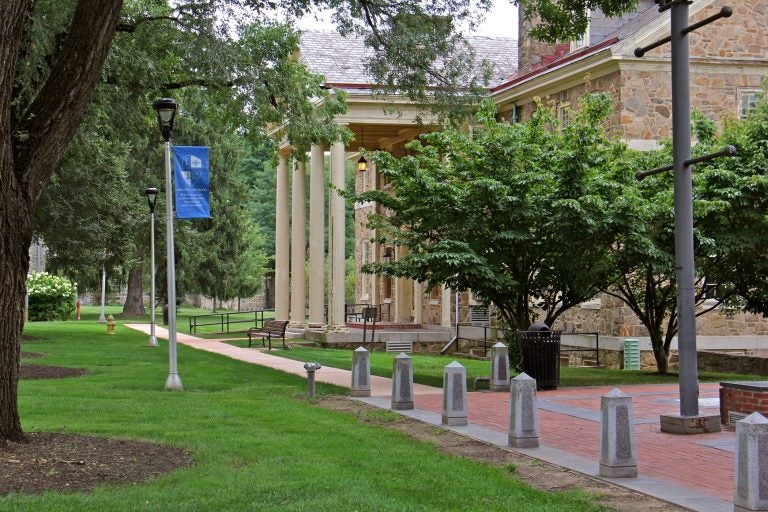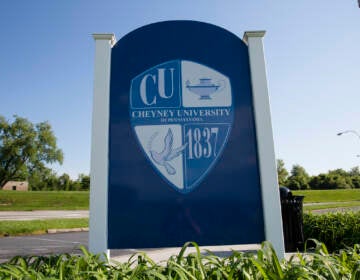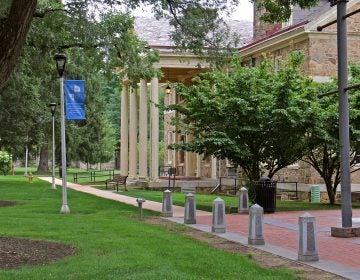Future of Cheyney at stake ahead of final school accreditation decision
Cheyney University has run out of lifelines and delays over the status of its accreditation.

Browne Hall on the quad at Cheyney University. (Emma Lee/WHYY)
This story originally appeared on The Philadelphia Tribune.
Cheyney University has run out of lifelines and delays over the status of its accreditation.
The Middle States Commission on Higher Education, the regional accrediting body, met on Thursday to weigh whether the nation’s oldest historically Black university will maintain its accreditation, which is vital to the school’s survival. The public and media were barred from attending the closed-door meeting in Philadelphia.
The commission reached a decision, known as an “action,” on Thursday, but did not announce it.
Middle States spokesman Brian Krishner said the commission has up to 60 days to publicly announce its decision, but will likely do so within a week.
The regional body will post the decision on its website.
Cheyney University President Aaron Walton said in a statement released Wednesday that university administrators were “cautiously optimistic” going into the meeting.
“Our university has made transformative progress structurally, financially and academically. We’re getting incredible support from our alumni and other constituencies,” he said. “We remain excited to hear the Commission’s final determination.”
Middle States has given Cheyney two accreditation extensions since the school was placed on probation in 2015 over compliance issues tied to its mismanagement and sloppy finances.
No further option is available for the commission to punt on Cheyney’s probation. The commission has two choices: Sustain or revoke the university’s accreditation.
“Right now, it’s binary,” Kirshner said.
A closed-door process
During the “show-cause appearance” before the commission, Cheyney representatives had an opportunity to present the steps they have taken to comply with Middle States’ policies, including documenting stable financial resources, making progress toward paying off the university’s debts, and showing how the school is balancing its books regarding the mismanagement of $29.5 million in federal funding, among other things.
Cheyney officials then left the room while the commissioners deliberated.
Members of the commission leaned on a multi-layered process to make a determination regarding the school’s accreditation status, including a report Cheyney officials submitted in August and site-visits at the school.
If the commission’s decision is to revoke Cheyney’s accreditation, the commission will set a date for when the school will lose it. Cheyney would then put into effect its pre-approved “teach-out plan” to allow students to complete their education or transfer while accreditation winds down.
Cheyney officials initially denied a Right to Know request filed by the Tribune to obtain the school’s teach-out plan, saying it is exempt from disclosure. The Tribune appealed that decision and the state Office of Open Records ruled in the Tribune’s favor on Monday. Cheyney has 30 days to provide the Tribune with a copy of the plan.
If the commission revokes Cheyney’s accreditation, school officials can appeal — but only on certain grounds — within 10 days of receiving its decision. Cheyney’s accreditation status would remain in effect until the completion of the appeals process. Cheyney is required to foot the bill for the appeal proceedings.
In the case of an appeal, a hearing would be scheduled for February, with a final decision coming within weeks after its conclusion. The hearing panel could affirm, amend, reverse, or remand the commission’s action. Decisions to affirm or reverse the commission’s actions are final.
Kirshner could not provide information about how many institutions have won appeals.
Cheyney’s accreditation is crucial to its survival.
The university cannot participate in federal aid programs without accreditation, which would cut off millions of dollars in federal funding. In the 2017-18 school year, 72% of first-time students received federal grants and 78% received federal loans aid, according to federal data.
How Cheyney got here
University spending had run in the red for nearly a decade before the school’s Council of Trustees approved a balanced spending plan in October.
Robert Bogle, the president and publisher of The Philadelphia Tribune, is chairman of the university’s council.
The school has racked up $40.3 million in debt to the Pennsylvania State System of Higher Education (PASSHE), which it is a member of along with 13 other schools. PASSHE will forgive $34.4 million of that debt if the university meets certain benchmarks in the coming years.
Cheyney officials mismanaged $29.5 million in federal funds it received between 2011 and 2014. The U.S. Department of Education has monitored Cheyney over administrative oversight issues related to the spending since 2015.
Student programs have suffered, too.
The university has cut the number of majors from 19 to 15 in recent years.
Last year was the first since 1914 that Cheyney did not have a football team. The school dropped out of the NCAA Division II for the 2018-19 school year and lost its membership in the Pennsylvania State Athletic Conference, which the school had held since 1951.
Enrollment shot up nearly 32% this year to more than 615 students.
However, the latest enrollment figures were the second-lowest at the school in the last decade. Enrollment at the school has been on a downward trend for 10 years from a high of 1,586 in 2010. In 2018, enrollment at the school plummeted 38%. Cheyney has the lowest enrollment of the 14 schools in the state system.
Cheyney’s four-year graduation rate is 7%, the lowest in the state system.
WHYY is your source for fact-based, in-depth journalism and information. As a nonprofit organization, we rely on financial support from readers like you. Please give today.




